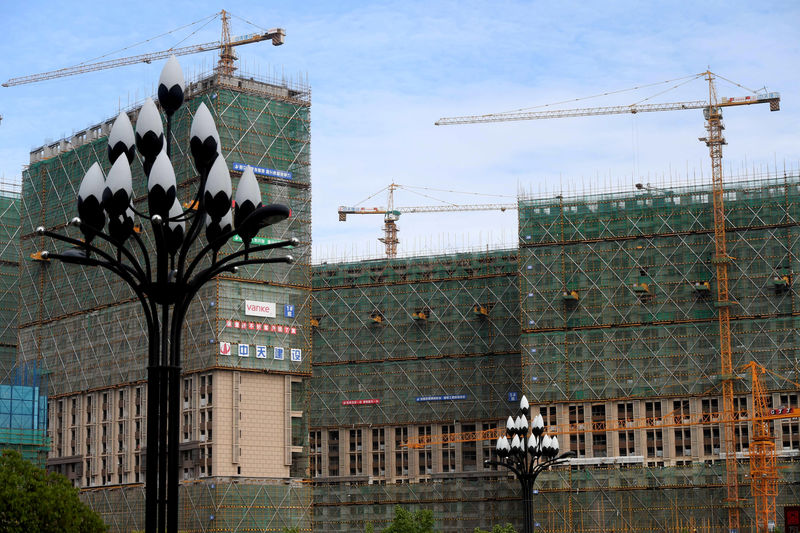By Clare Jim
HONG KONG (Reuters) - China's major property developers will report their first-half earnings next month, with some facing a sharp spike in interest costs and big foreign currency losses on overseas borrowing, and the hit could be harder in the second half.
The yuan weakened to a 13-month low this week as expectations of further policy easing piled pressure on the fragile currency, which has fallen steadily since April and suffered its worst month on record in June.
The currency is expected to come under more pressure in the second half if the trade disputes intensify.
That could spell bad news for the likes of Shimao Property (HK:0813) and China Evergrande (HK:3333) as a weaker yuan makes interest payments for U.S. and Hong Kong dollar debt more expensive. According to JP Morgan estimates, Shimao's average interest rate for its offshore debt of 39.6 billion yuan ($5.84 billion) is 5.3 percent, the interest it was expected to pay in foreign currency for 2018 was 2.1 billion yuan, so for every 5 percent yuan depreciation it will have to pay an extra 105 million yuan.
Evergrande has offshore debt of 134 billion yuan and its average interest rate is 7.5 percent, so a 5 percent fall in the yuan would increase its finance cost by 502.8 million yuan.
Overseas borrowing also creates foreign exchange liabilities when the dollar bonds are translated into yuan.
In 2015, when the yuan fell 5.7 percent, some Hong Kong-listed Chinese developers posted foreign exchange losses of more than 1 billion yuan, in some cases wiping more than 6 percent off earnings.
"2015 and 2016 were totally different environments, onshore rates were only 3.5 to 4.5 percent on average, much cheaper than dollar bond rates. There was no forex risk and it was much cheaper so a no-brainer for developers to raise more debt onshore," said JP Morgan analyst Ryan Li.
"But now onshore corporate bond issuance is not only tight but more expensive; the rates are 100-200 basis points higher than offshore."
According to his estimates, the direct impact from incremental interest costs and foreign exchange losses on Shimao's estimated profit this year would be around 25 percent for every 5 percent drop in the yuan.
In 2015, 48 percent of Shimao's debt was denominated in foreign currency. The company's net profit fell 24.5 percent that year, primarily because of foreign exchange losses.
Shimao lowered its proportion of U.S. and Hong Kong dollar borrowing from 2016 by increasing onshore financing and redeeming offshore bonds, taking its foreign borrowing to 34 percent of all debt.
But after China made it more difficult last year to get approval for onshore bonds and onshore rates outpaced offshore, Shimao's foreign debt exposure level rose back to around 43 percent of all debt in the first six months of this year.
"We have no plans to borrow less offshore as we still try to balance lower offshore funding costs versus foreign exchange risk," said investor relations manager Eva Lau.
The company now hedges less than 10 percent of its foreign currency-denominated debt due to high hedging costs.
The profit impact on state-owned companies China Jinmao (HK:0817) and Sino-Ocean (HK:3377) would also be around 25 percent and 24 percent respectively for every of 5 percent drop in the yuan, according to JP Morgan estimates.
China Evergrande, which has an offshore debt exposure totaling 134 billion yuan, would see profit decline by 21 percent per 5 percent drop in the yuan. Evergrande, Jinmao, Sino-Ocean declined to comment.
The yuan has fallen 1.9 percent in the first six months of this year.
These drastic-sounding losses, however, will not necessarily hit dividends because forex losses arise from mark-to-market value and are not calculated in the companies' core profit, which excludes non-recurring items as such currency losses.
The impact on core profit, for example, would be 1.3 percent for Shimao and 1.5 percent for Evergrande.
"FX loss is non-cash...hence not affecting dividend," Shimao's Lau said.
Chinese developers are due to post their first-half financial reports in August. Shares in Chinese property companies have already fallen around 20 percent since the second half of June, due in part to the yuan's decline.
Some developers have chosen to not hedge forex risks, however, believing that expensive hedging tools are a double-edged sword.
"Renminbi fluctuation is a national direction...it's difficult and expensive for companies to use swaps to hedge," said Simon Fung, chief financial officer of Hangzhou-based developer Greentown China (HK:3900).
Hedging would cost developers an extra 100 basis points, JP Morgan's Li said. Not only is hedging expensive, the limited instruments available in China also cast doubt over its effectiveness. Currently, most developers use basic forward contracts.

Developer Jinmao, which had no hedges in place at the time, said in its 2016 annual report it may hedge in future, but "the availability and effectiveness of these hedges may be limited, and the group may not be able to hedge the group's exposure successfully, or at all".